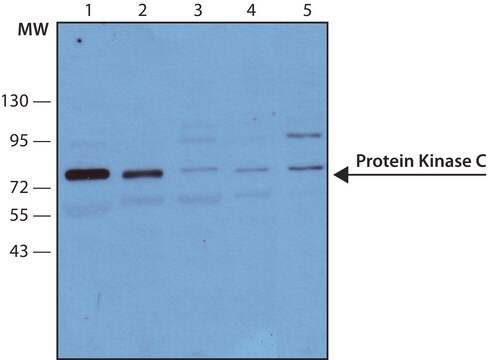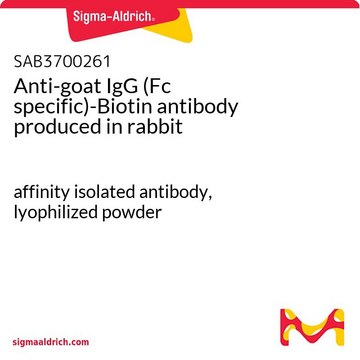SAB4200739
Anti-Protein kinase C antibody, Mouse monoclonal
clone MC5, purified from hybridoma cell culture
Sinonimo/i:
Anti-PKC
About This Item
Prodotti consigliati
Origine biologica
mouse
Livello qualitativo
Forma dell’anticorpo
purified from hybridoma cell culture
Tipo di anticorpo
primary antibodies
Clone
MC5, monoclonal
Stato
buffered aqueous solution
PM
antigen ~80 kDa
Reattività contro le specie
chicken, human, fish, mouse, bovine, rabbit, rat
Concentrazione
~1.0 mg/mL
tecniche
immunoblotting: 1.25-2.5 μg/mL using human bone marrow neuroblast SH-SY5Y cell extract
immunocytochemistry: suitable
immunofluorescence: suitable
immunoprecipitation (IP): suitable
Isotipo
IgG2a
N° accesso UniProt
Condizioni di spedizione
dry ice
Temperatura di conservazione
−20°C
modifica post-traduzionali bersaglio
unmodified
Informazioni sul gene
human ... PRKCA(5578)
Descrizione generale
Specificità
Applicazioni
- immunoblotting
- immunohistochemistry
- immunofluorescence
- immunoprecipitation
Azioni biochim/fisiol
Stato fisico
Stoccaggio e stabilità
Esclusione di responsabilità
Non trovi il prodotto giusto?
Prova il nostro Motore di ricerca dei prodotti.
Codice della classe di stoccaggio
10 - Combustible liquids
Punto d’infiammabilità (°F)
Not applicable
Punto d’infiammabilità (°C)
Not applicable
Scegli una delle versioni più recenti:
Certificati d'analisi (COA)
Non trovi la versione di tuo interesse?
Se hai bisogno di una versione specifica, puoi cercare il certificato tramite il numero di lotto.
Possiedi già questo prodotto?
I documenti relativi ai prodotti acquistati recentemente sono disponibili nell’Archivio dei documenti.
Il team dei nostri ricercatori vanta grande esperienza in tutte le aree della ricerca quali Life Science, scienza dei materiali, sintesi chimica, cromatografia, discipline analitiche, ecc..
Contatta l'Assistenza Tecnica.








